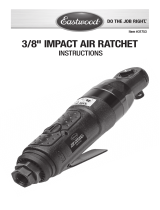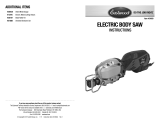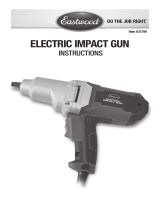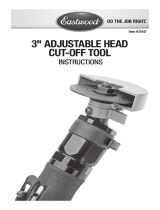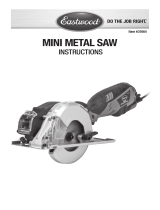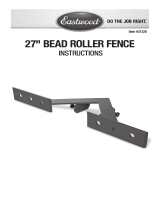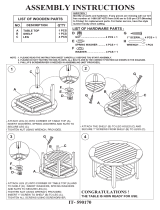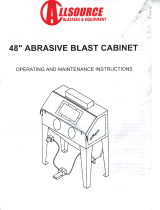Page is loading ...

ABRASIVE MEDIA
BLAST CABINET – B60
INS TRUCTIONS
Item #20557

2 Eastwood Technical Assistance: 800.343.9353 >> techelp@eastwood.com
The EASTWOOD ABRASIVE MEDIA BLAST CABINET – B60 is specifically designed with heavy-duty components and a quality powder coated finish to provide
years of trouble-free service. It features an LED work lamp for increased visibility and a baffled, flow-through ventilation design with an external vacuum
connection for portable or bolt-on vacuums.
SAFETY INFORMATION
WARNING indicates a hazardous situation which, if not avoided, will result in death or serious injury.
READ INSTRUCTIONS
Thoroughly read and understand this manual before using the Eastwood Abrasive Media Blast Cabinet – B60. Save for future reference.
ELECTRIC SHOCK HAZARD!
• Always plug into a properly grounded outlet.
• Under certain conditions (e.g. atmospheric humidity levels, type of media being used and/or type of media being blasted), the friction
of abrasive blasting may generate static electricity and result in shocking. We recommend grounding the blast cabinet in accordance
with local electrical codes.
• For indoor use only.
HEALTH HAZARD!
• Do not use with sand containing crystalline silica. Exposure to crystalline silica may cause silicosis, a serious lung disease,
cancer, and death.
• Dust generated by the blasting process can contain hazardous materials such as lead, zinc chromate, cadmium, and other toxic
compounds. Always wear a NIOSH-approved breathing apparatus when abrasive blasting.
• Never operate the blast cabinet with the door open. Always make sure the door is securely latched and sealed before operating.
• Never operate the blast cabinet without a properly filtered shop-type, dust collecting vacuum. If dust is seeping out of your
cabinet, stop immediately and replace vacuum filter!
OPERATION WARNINGS!
• Never overload the blast cabinet. Maximum weight capacity of object to be blasted is 132 lbs.
Maximum weight capacity of blast media is 100 lbs.
• Inlet air pressure must not exceed 120 PSI. Excessive air pressure can cause permanent damage to the unit and personal injury.
• Disconnect air supply before making adjustments, changing accessories, or storing the cabinet.
• Never use bottled gas as an air source for this cabinet.
SPECIFICATIONS
• Electrical current requirement (lamp): 120 Volt AC, 60hz; 0.034 amp
• Air supply requirements: 7 CFM @ 90 PSI.
• Internal Dimensions: 36" wide x 24" deep x 23" high.
36.25"
24.25"
58.75"
Always use a clean, dry, regulated air supply.
Moisture and or oil in air supply will cause
clogging of blast media.

A
T
T
D
C
X
F
E
G
L
J
Y
Q
B
P
O
N
I
R
S
H
Z
K
W
M
U
V
PP
INCLUDES
Part Description Qty.
A Door 1
B Shelf 1
C Cabinet Back Panel 1
D Cabinet Top Panel 1
E Cabinet Left Side Panel 1
F Switch Box 1
G Leg 4
H Cabinet Front Panel 1
I Cabinet Right Side Panel 1
J Hopper Back Panel 1
K Hopper Front Panel 1
L Hopper Side Panel 2
M Latch 2
Part Description Qty.
N Hopper Drain Door 1
O Media Suction Tube 1
P Hopper Corner Reinforcements 4
Q Shelf Floor Supports 1
R Gloves 1
S Hose Clamp 2
T Door Struts 2
U Seal Ring 2
V Glove Seat 2
W Media Blasting Gun 1
X Vacuum Baffle 1
Y Hopper Bottom Frame 1
Z Hopper Drain Latch 1
Part Description Qty.
AA M6 x 12mm Screw 118
BB M4 x 16mm Screw 15
CC M4 x 10mm Screw 30
DD M4 x 6mm Screw 2
EE M6 Nut 75
FF M4 Nut 20
GG M4 Flat Washer 35
JJ Thick Sealing Foam 2
KK Thin Sealing Foam 6
LL Air Input Regulating Plate 1
MM Knob Screw 1
NN Air Inlet Cover 1
OO Thread Sealing Tape 1
PP Transformer 1
QQ LED Lamp 1
RR RTV Sealer (tube) 2
SS Vacuum Elbow 1
TT Spring Washer 4
Spare Nozzles 3
Spare Glass Film 5
LL
SS
To order parts and supplies: 800.343.9353 >> eastwood.com 3
TOOLS REQUIRED (not included)
• Phillips screwdriver
• 7mm and 10mm sockets or wrenches
• 12mm and 14mm wrenches
QQ

HOPPER ASSEMBLY
1. Peel away protective paper and apply Thin Sealing Foam (KK) on
the INNER face, along the bottom of the flanges of Hopper Back
Panel (J) and Hopper Front Panel (K) (FIG. 1).
2. Install Hooper Drain Latch (Z) onto Hopper Front Panel (K) with
loop facing small end and attach with two M4 x 10 screws (CC)
and two washers (GG) then tighten (FIG. 2).
3. Attach 1st Hopper Side Panel (L) to Hopper Front Panel (K)
with five M6 x 12mm screws (AA) and nuts (EE) trapping the
Sealing Foam between panels. (Do not fully tighten screws
at this time) (FIG. 2).
4. Attach 2nd Hopper Side Panel (L) to opposite side of Hopper Front
Panel (K) with five M6 x 12mm screws (AA) and nuts (EE) trapping
the Sealing Foam between panels. (Do not fully tighten screws at
this time) (FIG. 3).
4 Eastwood Technical Assistance: 800.343.9353 >> techelp@eastwood.com
FIG. 1
FIG. 2
J
KK
KK
KK
K
EE
AA
L
Z
CC
K
FIG. 3
EE
AA
L
5 Pcs. AA M6 x 12mm Screw
5 Pcs. EE M6 Nut
ASSEMBLY HAZARD!
• Install a shutoff valve on the air supply line
for emergency shutoff.
• Wear safety goggles and work gloves
during assembly.
KK
2 Pcs. CC M4 x 10mm Screw
2 Pcs. GG M4 Washer
5 Pcs. AA M6 x 12mm Screw
5 Pcs. EE M6 Nut

1. Attach Hopper Back Panel (J) to Hopper Side Panels (L) with
ten M6 x 12mm screws (AA) and nuts (EE) trapping the Sealing
Foam between panels (FIG. 4).
2. Make sure all four panel edges at top and bottom of Hopper
Assembly are flush and then evenly tighten the M6 x 12mm
screws (FIG. 4).
3. Peel away protective paper and apply Thin Sealing Foam (KK) on
the bottom of the flange of Hopper Assembly (FIG. 5).
4. Attach Hopper Bottom Frame (Y) to Hopper Assembly with
eight M4 x 10mm screws (CC) and 4mm Flat Washers (GG).
Tighten screws (FIG. 5).
5. Install the Hopper Drain Door (N) to Hopper Back Panel (J)
with three M6 x 12 mm screws and tighten (FIG. 5).
6. Attach four Hopper Corner Reinforcements (P) to the INSIDE of
Upper Hopper Flange with four M4 x 10mm screws (CC) and
4mm Flat Washers (GG). Tighten screws (FIG. 6).
To order parts and supplies: 800.343.9353 >> eastwood.com 5
FIG. 4
FIG. 5
FIG. 6
AA, EE
AA
N
Y
GG
CC
KK
GG
CC
P
J
AA, EE
J
L
10 Pcs. AA M6 x 12mm Screw
10 Pcs. EE M6 Nut
8 Pcs. CC M4 x 10mm Screw
8 Pcs. GG M4 Washers
3 Pcs. AA M6 x 12mm Screw
8 Pcs. CC M4 x 10mm Screw
8 Pcs. GG M4 Washers

6 Eastwood Technical Assistance: 800.343.9353 >> techelp@eastwood.com
1. Install Media Suction Tube (O) to Hopper Front Panel (K)
with two M6 x 12mm screws (AA) and nuts (EE) (FIG. 7).
2. Peel away protective paper and apply Thin Sealing Foam (KK)
on the upper OUTER surface of the Hopper Side Panels (L).
Wrap the Sealing Foam around the front and back of the
Hopper Assembly about 1-1/4” (FIG. 8).
FIG. 7
FIG. 8
EE
AA
K
O
L
KK
KK
L
1-1/4"
2 Pcs. AA M6 x 12mm Screw
2 Pcs. EE M6 Nut

To order parts and supplies: 800.343.9353 >> eastwood.com 7
CABINET ASSEMBLY
1. Attach Cabinet Left Side Panel (E) with four M6 x 12mm Screws
(AA) in outer 4 holes only, (no screws in center holes at this
time). NOTE: Be sure that Left Side Panel (E) is installed with
the angled corner facing upward and forward (FIG. 9).
2. Install Shelf Floor Support (Q) (NOTE: open side downward)
to Cabinet Left Side Panel (E) with one M6 x 12mm Screws (AA)
(FIG. 9).
3. Attach Cabinet Right Side Panel (I) & Shelf Floor Support (Q)
with five M6 x 12mm Screws (AA) (FIG. 10).
4. Tighten all screws (FIG. 10).
5. Peel away protective paper and apply Thin Sealing Foam (KK)
along the rear flanges of Cabinet Side Panels (E) and (I) and
Hopper Back Panel (J) (FIG. 11).
FIG. 9
FIG. 10
FIG . 11
K
E
Q
AA
Q
AA
I
I
E
J
KK
5 Pcs. AA M6 x 12mm Screw
5 Pcs. AA M6 x 12mm Screw

8 Eastwood Technical Assistance: 800.343.9353 >> techelp@eastwood.com
1. Attach Cabinet Back Panel (C) to the rear flanges of Cabinet
Side Panels (E) and (I) and Hopper Back Panel (J) with fifteen
M6 x 12mm screws (AA). NOTE: not all holes receive screws at
this time, refer to figure 12 for locations and be sure that larger
punched holes are in proper orientation. (Do not fully tighten
screws at this time to allow for alignment of remaining leg holes.)
(FIG. 12).
2. Install 2 Legs (G) to the rear flanges of Cabinet Side Panels (E)
& (I), Cabinet Back Panel (C) and Hopper Back Panel (J) with
sixteen M6 x 12mm screws (AA) and nuts (EE). Do not fully
tighten screws at this time (FIG. 12).
3. Peel away protective paper and apply Thin Sealing Foam (KK)
along the front-facing flanges of Cabinet Side Panels (E) and (I)
and Hopper Front Panel (K) (FIG. 13).
4. Attach Cabinet Front Panel (H) to the front flanges of Cabinet
Side Panels (E) & (I) and Hopper Front Panel (K) with thirteen M6
x 12mm screws (AA). NOTE: not all holes receive screws at this
time, refer to figure 12 for locations. (Do not fully tighten screws
at this time to allow for alignment of remaining leg holes) (FIG.
14).
5. Install 2 Legs (G) to the rear flanges of Cabinet Side Panels (E)
and (I), Cabinet Front Panel (H) and Hopper Front Panel (K) with
sixteen M6 x 12mm screws (AA) and nuts (EE). Do not fully
tighten screws at this time (FIG. 14).
FIG. 12
FIG. 13
FIG. 14
E
I
AA
G
G
C
E
I
KK
K
H
G
AA
G
29 Pcs. AA M6 x 12mm Screw
14 Pcs. EE M6 Nut
31 Pcs. AA M6 x 12mm Screw
20 Pcs. EE M6 Nut

To order parts and supplies: 800.343.9353 >> eastwood.com 9
INSTALLING
REMAINING COMPONENTS
1. Stand assembled unit up on it’s legs (FIG. 15).
2. Tighten leg screws to ensure unit sits level.
3. Install the Media Blasting Gun (W) Suction Hose to the Media
Suction Tube (O), secure with a Hose Clamp and tighten (FIG. 15).
4. Place the Media Blasting Gun (W) Air Supply Hose Fitting through
the through hole in the lower right corner of the Cabinet Front
Panel (H) using a large flat washer on either side. Wrap thread
sealing tape around fitting threads and secure with the
Air Supply Fitting Nut (FIG. 15).
5. Let the Media Blasting Gun (W) hang out of the right front corner
of the Cabinet (FIG. 15).
6. Set the Shelf (B) (with angled cut off corner toward right front of
cabinet) and allow it to rest on the hopper flanges and Shelf
Floor Support (Q) (FIG. 15).
7. From the outside, install 2 sets of Seal Rings (U) and Glove Seats
(V) into the large holes in the Cabinet Front Panel (H) and secure
with twelve M4 x 16mm screws (BB), flat washers, (GG) and nuts
(FF) (FIG. 16).
8. Fit 2 Hose Clamps (S) over the Glove Sleeves then slide the Gloves
(R) fully over the Glove Seats (V) then tighten Hose Clamps (S)
securely (FIG. 16). NOTE: Be sure to install left and right hand
gloves on the correct side and position them with thumbs upward.
9. From the outside, install the Air Input Regulating Disk (LL) over the
six hole array on the upper rear corner of the Cabinet Back Panel
(C) and secure with Knob Screw (MM) (FIG. 17).
10. From the inside, install the Vacuum Elbow (SS) with grommet.
Next, install the Vacuum Baffle (X) over the vacuum hole on the
upper left corner of the Cabinet Back Panel (C) and secure with
four M6 x 12mm screws (AA) and nuts (EE) (FIG. 17).
FIG. 15
FIG. 16
FIG. 17
H
B
W
Air Supply
Hose Fitting
Washer
Air Supply
Fitting Nut
Air Flow
H
H
S
R
U
V
BB
V
U
BB
FF, GG
AA
C
MM
LL
FF, GG
CC
EE
X
M
M
H
12 Pcs. BB M4 x 16mm Screw
12 Pcs. GG M4 Washers
12 Pcs. FF M4 x 12mm Screw
B
4 Pcs. AA M6 x 12mm Screw
4 Pcs. EE M6 Nut
1 Pc. SS Vacuum Elbow
SS

10 Eastwood Technical Assistance: 800.343.9353 >> techelp@eastwood.com
11. Install Latches (M) to the upper corners of the Cabinet Front
Panel (H) and secure with four M4 x 10mm screws (CC), flat
washers, (GG) & nuts (FF) (FIG. 17).
12. Peel away protective paper and apply Sealing Foam (KK) on the
exposed level flange areas on the top of the Cabinet Side Panels
(E) and (I) and along the top edge of the Cabinet Back Panel (C)
(FIG. 18). NOTE: Be sure that no gaps exist between sections of
sealing foam.
13. Snap LED Lamp (QQ) into Lamp Clips (FIG. 19).
14. Route the cord of the LED Lamp (QQ) through the hole in the
upper area of Cabinet Side Panel (E) then thread the cord ferrule
into the hole (FIG. 19).
15. Bolt down Box Top Panel with eleven M6 x 12 screws and nuts.
16. Connect the LED Lamp (QQ) wires to the Switch (F) wires. At-
tach Blue Wire to Blue wire connection and Brown Wire to the
Gray wire connection (FIG. 19). NOTE: Needle Nose pliers may
be useful for inserting wires to switch connection.
17. Attach Switch (F) to Cabinet Side Panel (E) with two M4 x 10mm
screws (CC), washers (GG) and nuts (FF) (FIG. 19). NOTE: Be
sure to position the switch facing forward towards operator.
18. Peel away protective paper and apply Thick Sealing Foam (JJ)
on the remaining exposed angled flange areas on the opening
of the Cabinet Assembly (FIG. 20). NOTE: Be sure that no gaps
exist between sections of sealing foam.
19.
Attach Door (A) hinge plate to the Cabinet Top (D) with six M6 x
12mm screws (AA) and nuts (EE) (FIG. 20). NOTE: Do not let door
fall backward against top or glass window breakage will result.
FIG. 18
FIG. 19
FIG. 20
E
KK
C
I
AA
FF
TT
D
GG
FF
F
CC
E
JJ
JJ
JJ
JJ
I
H
E
2 Pcs. CC M4 x 10mm Screw
2 Pcs. GG M4 Washers
2 Pcs. FF M4 Nut
6 Pcs. AA M6 x 12mm Screw
6 Pcs. EE M6 Nut
blue wire blue wire
gray wire
brown wire
Lamp Wire
Connection
QQ

To order parts and supplies: 800.343.9353 >> eastwood.com 11
20. Install 2 Door Supports (T) to the Cabinet Side Panels with a
12mm wrench (FIG. 21).
21. Attach Door Supports (T) to the Door (A) with 12mm and 14mm
wrenches (FIG. 21).
22. Plug the Transformer (PP) connector into the Switch (F)
(FIG. 21).
23.
Apply a liberal amount of RTV Sealer (RR) to ALL interior joints
containing Sealing Foam (KK). While wearing a disposable glove,
use index finger to spread the sealer evenly all along the joints
which are glove height and below, to guarantee sealing (FIG. 21).
24. The interior side of tempered glass window of the Door (A) is
equipped with a replaceable, peel-off, self-adhesive flexible
window shield. It will become cloudy with use. To replace, first
peel off worn shield and then gently clean glass with a soft cloth
and glass cleaner or alcohol. Peel off adhesive protective strips
and apply replacement shield to interior glass surface. Press on
adhesive areas to ensure an abrasive proof seal.
FIG. 21
AA, EE
A
A
T
T
CC
RR
RR
PP
F
SET-UP CABINET FOR USE
• The inlet air supply must have a moisture separator capable of removing all moisture and impurities from the air supply. Moisture and/or oil in the
air supply will cause clumping and clogging of the media.
• A suitable regulator must be used to limit incoming air pressure to 90 PSI maximum, 80 PSI is ideal. Excessive air pressure can cause permanent
damage to the unit.
• For best results, a heavy-duty type vacuum with 1.0 to 2.0 peak horsepower is recommended.
• Slip the hose over the Vacuum Elbow at the rear of the cabinet.
NOTE: Only a light amount of negative pressure needs to be generated in order to keep a dust cloud from forming in the cabinet.
• To adjust airflow, close cabinet door and turn on the vacuum. There should be sufficient negative pressure in the cabinet to cause the blast gloves to
“balloon” slightly. If they lift up and stick straight into the cabinet, there is too much vacuum. If they do not balloon and just lie flat, there is not enough.
Rotate the Air Input Regulating Plate to adjust vacuum.
• Never operate the blast cabinet without a properly filtered shop-type, dust collecting vacuum. If dust is seeping out of your vacuum filter, stop
immediately! This is a serious health hazard and will prematurely damage your vacuum motor. Purchase and install a fine particulate filter for your
particular brand of shop-type vacuum to capture these dust particles.
• Check the Hopper Drain Door (N) and make sure it is closed tightly.
• Add 50 lbs. of Eastwood approved Blast Media. Up to 100 lbs. may be used. DO NOT USE SAND IN THIS BLAST CABINET!
NOTE: For best results and to avoid nozzle clogging, do not use media larger than 60 grit particle size.
Congratulations! Your fully assembled Eastwood Blast Cabinet is
now ready to be filled with media and put to work!

PROBLEM CAUSE CORRECTION
Insufficient
Air to
Blasting Gun
Compressor Inadequate
For best results, a compressor capable of at least 10 CFM @ 80-90 PSI is
recommended. Lesser output will result in diminished performance.
Air Line from Compressor Too Small Use air supply line of 5/16” or larger.
Air Line from Compressor Too Long An air line of 25’ maximum is recommended.
Pinched or Damaged Section of Hose Replace suction hose. Automotive fuel or heater hose works well.
Media Surging
Moisture in Media and/or Air Supply
Install a moisture separator capable of removing all moisture and impurities
from the air supply.
Dirt or Blasting Residue in Gun Nozzle
Clean out gun nozzle, then drain and sift blast media to remove debris before
re-use.
Excessive Media in Hopper
For best results, operate blaster with the media suction tube buried several
inches in media. 25 lbs. of media is generally sufficient.
Media Stream
Suddenly
Stops
Dirt or Debris in Suction Hose
To dislodge blockage, place a gloved finger over the nozzle outlet and
momentarily depress trigger.
Media is Contaminated Drain and sift blast media to remove debris before re-use.
View in
Cabinet
Becomes
Obstructed
Vacuum May Not be Operating Correctly
If dust cloud is present, check to see that vacuum system is functioning
properly and the Air Inlet Regulating Plate is adjusted per instructions.
Lens Shield is Worn Clean inside of window and replace peel-off lens shield.
TROUBLESHOOTING
ACCESSORIES
#30998 Dust Collection System
#21133 Eastwood Blast Cabinet Foot Pedal and Gun
#22022 Blast Media Sifter Screen
#20608 Filter/Regulator Unit with Gauge
#22019 Silicon Carbide Media, 60 Grit
#22021 Aluminum Oxide Media, 60 Grit
#13792 Aluminum Oxide Media, 90 Grit
#13772 Glass Bead Media, 100/170 Grit
#22023 Glass Bead Media, 70/100 Grit
#20068 Replacement Nozzles, 4pc
#20071 22" x 10-1/2" Window Liners, 5pc
© Copyright 2018 Easthill Group, Inc. 8/18 Instruction item #20557Q Rev 1
If you have any questions about the use of this product, please contact
The Eastwood Technical Assistance Service Department: 800.343.9353 >> email: techelp@eastwood.com
PDF version of this manual is available at eastwood.com
The Eastwood Company 263 Shoemaker Road, Pottstown, PA 19464, USA 800.343.9353 eastwood.com
/



